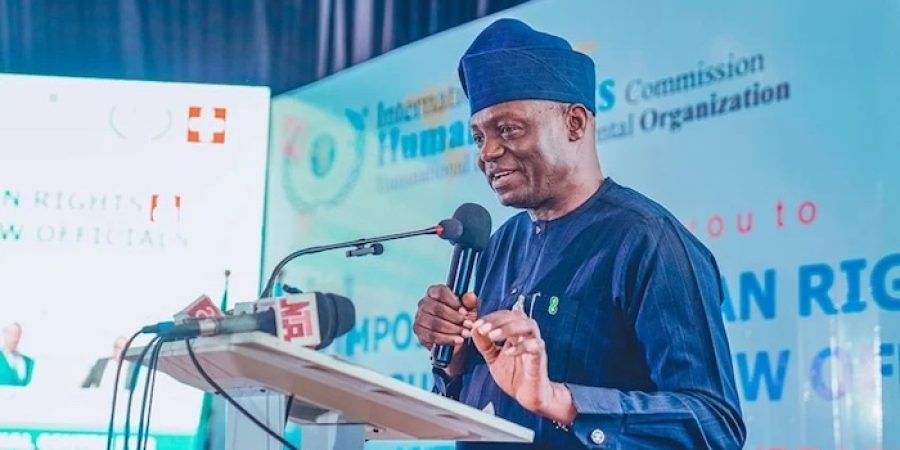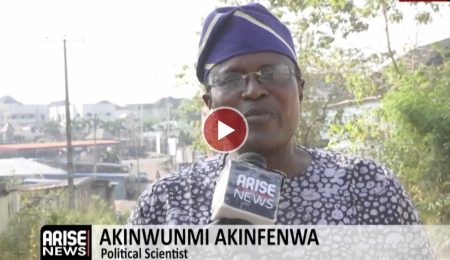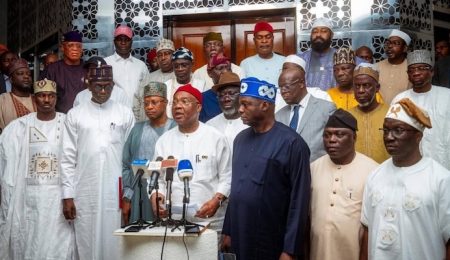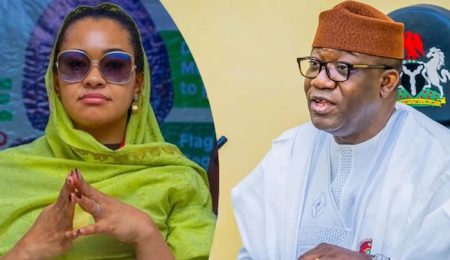The emergence of Dr. Abdullahi Umar Ganduje’s successor, Prof. Nentawe Yilwatda, as the new National Chairman of the All Progressives Congress (APC) on Thursday, has sent ripples through Nigeria’s political landscape, especially as actors and political parties begin to look towards the 2027 general election.
Yilwatda, the Minister of Humanitarian Affairs, Disaster Management and Social Development assumes the party’s top position at a critical time when President Bola Tinubu is consolidating his political machinery for a potential re-election bid.
His emergence is widely seen as a strategic move to deepen the ruling party’s roots in the North, recalibrate internal cohesion, and set the stage for a more coordinated campaign structure ahead of 2027.
For Tinubu, the choice of Yilwatda appears to be a calculated alignment with North Central, especially Plateau, where the APC lost both the presidential and gubernatorial elections. The north central remains a vital electoral stronghold, and having a trusted ally with deep grassroots connections and political clout in the region strengthens the APC’s positioning. It addresses not just regional balancing but also the lingering concerns around the Muslim-Muslim presidential ticket adopted by the APC in 2023. As a Christian from the North, his appointment appears to be a deliberate effort to calm internal discontent and project a more inclusive image of the party’s leadership.
Yilwatda’s political experience, coupled with his loyalty to the party and its national leader, may help bridge lingering factional divides and neutralise opposition within and outside the APC’s base. His leadership could also influence the party’s narrative, discipline, and engagement with critical constituencies. Also, as the political chessboard for 2027 begins to form, Yilwatda’s stewardship of the APC could prove pivotal in determining not just the party’s electoral strength but also its ideological coherence and national relevance.
Yilwatda was elected during the APC’s 14th National Executive Committee (NEC) meeting held at the Presidential Villa, Abuja. He replaced Ganduje, who resigned on June 27, citing health challenges.
Within 12 years since the APC came into existence, the ruling party has had six chairmen. They are: National Chairmen from 2013 to date Chief Bisi Akande (2013 – 2014); Chief John Odigie Oyegun (2014 – 2018); Comrade Adams Oshiomhole (2018 –2020); Governor Mai Mala Buni (2020 – 2022); Sen. Abdullahi Adamu (2022 – 2023); Dr. Abdullahi Ganduje (2023 – 2025) and now Yilwatda.
Interestingly, the ruling party hardly convenes NEC meetings unless there is an internal crisis or the need to replace its Chairman. The one held on Thursday was no different.
Indeed, Yilwatda’s emergence reflected a deliberate shift from the tradition of the ruling party appointing former governors as party chairmen.
Clearly, the emergence of the Minister is to assuage the North Central who felt shortchanged following the resignation of Adamu.
The former Governor of Nasarawa state (North Central) was the chairman of the ruling party between 2003 and 2005 and was replaced by Ganduje who is from the North-west.
Since then, the North Central stakeholders continued their agitation for the position to be zoned back to them.
Yilwatda’s emergence, however, altered the zoning of national offices within the National Working Committee.
That was why, with the resignation of Festus Fuanter (Plateau) as deputy national secretary, the party announced new appointments. National Legal Adviser Prof. Abdulkarim Kana (Nasarawa, North Central) was moved to deputy national secretary, while Murtala Kankia (Katsina, North West) became the new national legal adviser.
Before now, the ruling party has been practically on sabbatical, with the opposition parties enmeshed in internal crisis. This made it impossible for them to put the APC, which already assumed that 2027 was going to be a walkover, on its toes. During this period, the ruling party that ought to be setting the agenda busied itself with issuing statements to celebrate birthdays and milestone achievements recorded by party members.
But with the African Democratic Congress (ADC) emerging as a formidable opposition and the Peoples Democratic Party (PDP) now putting its house in order for the first time in a long while, it is no longer business as usual for the ruling party.
It was in the light of this that the party thought it wise to assuage the anger of the North Central. Hence, the reason why Tinubu and his team are strategically targeting states that did not vote for him in 2023, with some of his recent appointments in the North seen as politically calculated moves to win support ahead of 2027.
A Public affairs analyst and Legislative Consultant, Mr. Akinloye Oyeniyi, described Yilwatda’s emergence as a welcome development.
He noted: “Since the beginning of the Fourth Republic, Nigerians have been yearning for political party administration that is top-notch, and as funny as God will make it come true, it is coming from the least expected group- the APC.
“His emergence is also important because it will challenge other political parties to get their acts right as regards party management.
“Nentawe Yilwatda now emerging from North Central is returning the position to its original zone.
“This has now tactically retained all positions in their original zones, which has now settled the rumour of President Tinubu considering North West for vice president.”
Oyeniyi was of the opinion that the choice of Yilwatda at a time when the PDP, the Labour Party (LP) and the ADC are all still trying to find their feet, would go a long way to stabilise the ruling party and also make some Nigerians to consider APC.
The France chapter of the APC called on Yilwatda to ensure unity and discipline in the party.
France Chairperson of the party, Hajia Amina Baba, in a statement issued on Friday, expressed confidence in Yilwatda’s ability to provide visionary leadership that aligns with the Renewed Hope Agenda of President Tinubu.
“We will leverage our unique positions to mobilise support, promote our party’s ideals, and advocate for the interests of Nigerians abroad.
“We look forward to working closely with you to strengthen our party’s presence in Europe, foster greater engagement with Nigerian communities, and support initiatives that promote democracy, development, and progress in our beloved nation.
“As you take on this crucial role at such a defining moment in our nation’s democratic journey, we are eager to collaborate with you and support your vision for the APC,” Baba added.
But the immediate past National Chairman of the party said Yilwatda’s appointment was strategic.
Ganduje in a statement he personally signed expressed profound confidence in the capacity, intellect, maturity and administrative competence of the new chairman to move the Party forward.
In his submission, acting spokesperson of APC in Plateau State, Shittu Bamaiyi, said Nentawe’s emergence would boost the party’s chances in the state and increase the likelihood of reclaiming Plateau from the PDP in 2027.
He said: “For President Tinubu to have opted for Prof Nentawe among other contending interests and political juggernauts from the North Central zone is not only instructive, but reflects the absolute trust and confidence the president has in the minister to effectively pilot the affairs of the APC in the face of daunting political challenges.”
However, the APC will have to do more than enough to convince Nigeria to vote for the party in 2027.
Political analysts are of the view that the job of the APC might equally be made easy considering the fact that only few of the leaders of ADC are without baggage, and they appear more interested in fighting for their stomachs than fighting for Nigerians.
Be that as it may, 2027 is going to be tricky and interesting.
Adedayo Akinwale
Follow us on:



